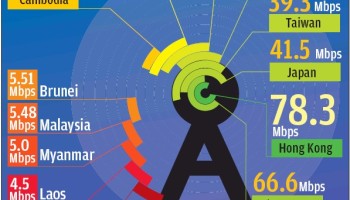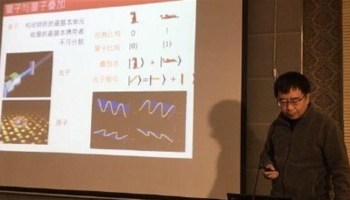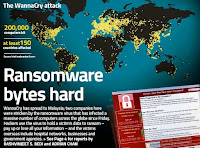 |
New chip: A Kunpeng 920 chip is displayed
during an unveiling ceremony in Shenzhen. Huawei is seeking growth
avenues in cloud computing and enterprise services. — AP
https://youtu.be/IX5k_k4Q68c |
HONG KONG: Huawei Technologies Co Ltd has launched a new chipset for use in servers, at a time when China is pushing to enhance its chip-making capabilities and reduce its heavy reliance on imports, especially from the United States.
Huawei, which gets the bulk of its revenue from the sale of telecommunications equipment and smartphones, is seeking growth avenues in cloud computing and enterprise services as its equipment business comes under increased scrutiny in the West amid worries about Chinese government influence over the firm.
Huawei has repeatedly denied any such influence.
Chinese firms are also seeking to minimise the impact of a trade dispute that has seen China and the United States slap tariffs on each other’s technology imports.
For Huawei, the launch of the chipset – called the Kunpeng 920 and designed by subsidiary HiSilicon – boosts its credentials as a semiconductor designer, although the company said it had no intention of becoming solely a chip firm.
“It is part of our system solution and cloud servicing for clients. We will never make our chipset business a standalone business,” said Ai Wei, who is in charge of strategic planning for Huawei’s chipsets and hardware technology.
The Shenzhen-based company already makes the Kirin series of smartphone chips used in its high-end phones, and the Ascend series of chipsets for artificial intelligence computing launched in October.
It said its latest seven nanometre, 64-core central processing unit (CPU) would provide much higher computing performance for data centres and slash power consumption.
It is based on the architecture of British chip design firm ARM – owned by Japan’s SoftBank Group Corp – which is seeking to challenge the dominance in server CPUs of US maker Intel Corp.
Huawei aims to drive the development of the ARM ecosystem, said chief marketing officer William Xu. He said the chip has “unique advantages in performance and power consumption”.
Xu also said Huawei would continue its “long-term strategic partnership” with Intel.
Huawei’s new ARM-based CPU is not a competitor to the US company’s x86 CPUs and servers, but complementary, Xu added. Redfox Qiu, president of the intelligent computing business department at Huawei, said the company shipped 900,000 units of servers in 2018, versus 77,000 in 2012 when it started.
Huawei was seeing “good momentum for the server business in Europe and Asia Pacific” and expects the contribution from its international business to continue to rise, Qiu added.
Huawei also released its TaiShan series of servers powered by the new chipset, built for big data, distributed storage and ARM native applications.
The firm founded chip designer HiSilicon in 2004 to help reduce its reliance on imports.
In modem chips, Huawei internally sources 54% of those in its own devices, with 22% coming from Qualcomm Inc and the remainder from elsewhere, evidence presented at an antitrust trial for Qualcomm showed. — Reuters
Related:
Huawei's revenue growth rebounds despite `storm-tossed' 2018

































 Ransomware blackmails Internet users by encrypting the files on their computer or mobile device and demanding payment, generally in the virtual currency bitcoin, to unlock them. — dpa
Ransomware blackmails Internet users by encrypting the files on their computer or mobile device and demanding payment, generally in the virtual currency bitcoin, to unlock them. — dpa



